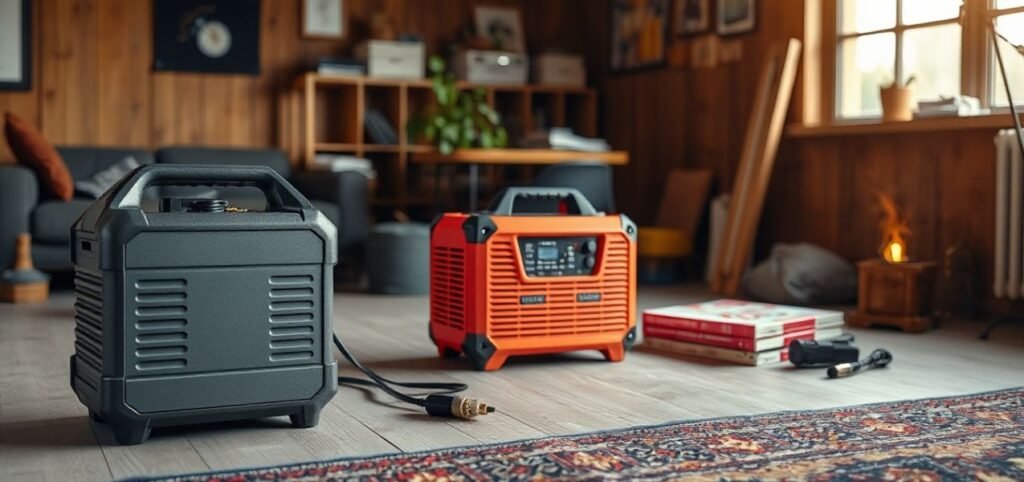In today’s world, staying connected is essential, whether you’re camping in the mountains, traveling in an RV, or dealing with a power outage. Portable power stations make this possible by providing electricity for charging devices, powering small appliances, and even running medical equipment when you’re away from a regular power source. Here, we’ll look at some of the best portable power stations for 2024, so you can make an informed choice for your next adventure or emergency preparedness kit.

5 Best Portable Power Stations
1. EcoFlow Delta 2 – Best Overall for Performance and Value
The EcoFlow Delta 2 is known for its impressive power output, fast charging time, and durable design. With a battery capacity of 1,024 watt-hours, it can power devices like laptops, mini-fridges, and even electric grills. Plus, it charges from 0 to 80% in just under an hour when plugged into a wall outlet, one of the fastest charging times on the market. The Delta 2 is lightweight for its power capacity, making it easy to carry around while still packing a punch in terms of performance.
- Pros: Fast charging, high power capacity, durable.
- Cons: Higher price point.
- Best For: Long trips, RV owners, and those needing a reliable power backup.
2. Jackery Explorer 1000 – Best for Long Battery Life
Jackery is a well-known brand in the world of portable power stations, and the Explorer 1000 stands out for its long-lasting battery. With a capacity of 1,000 watt-hours, this station can keep your devices running for extended periods. The Explorer 1000 has multiple output options, including USB, AC, and DC ports, making it easy to connect multiple devices at once. It’s compatible with solar panels, meaning you can recharge it even if you’re completely off the grid.
- Pros: Long battery life, solar charging capability, lightweight.
- Cons: Slower to recharge compared to some models.
- Best For: Long camping trips, off-grid adventures, and backup during outages.
3. Anker PowerHouse II 800 – Most Portable Option
The Anker PowerHouse II 800 is a compact and lightweight choice for those prioritizing portability without sacrificing power. With a capacity of 777 watt-hours, it’s suitable for charging smartphones, laptops, cameras, and other small devices. It includes multiple USB ports, a DC port, and a 300W AC outlet. While it’s not designed for high-power appliances, it’s great for anyone who needs a reliable power source on short trips.
- Pros: Compact and easy to carry, affordable.
- Cons: Limited power capacity for large appliances.
- Best For: Short trips, day hikes, and as an emergency power bank.
4. Goal Zero Yeti 1500X – Best for Heavy-Duty Power Needs
The Goal Zero Yeti 1500X is the ideal choice for those who need serious power for multiple high-energy devices. With a capacity of 1,516 watt-hours, it can power things like refrigerators, power tools, and medical devices. Its rugged design is built to withstand the outdoors, and with the option to charge via solar panels, it’s a reliable choice for long-term off-grid living. However, this level of power comes with a higher price and weight.
- Pros: High power output, suitable for large appliances, durable.
- Cons: Expensive, heavy.
- Best For: Home backup, remote work sites, long-term camping.
5. Bluetti EB3A – Budget-Friendly Option
For those on a tighter budget, the Bluetti EB3A is a great option. With a 268 watt-hour capacity, it’s smaller than some of the other options but still very effective for charging phones, laptops, and small devices. It has several charging options, including AC, USB, and DC, and is compact enough to fit in a backpack. While it may not have the power to run larger appliances, it’s a reliable and affordable choice for those looking for an entry-level power station.
- Pros: Affordable, compact, multiple port options.
- Cons: Limited capacity for high-power devices.
- Best For: Day trips, emergencies, small electronics.
What to Look for When Choosing a Portable Power Station
When selecting the right portable power station, consider the following:
- Power Capacity: Measured in watt-hours (Wh), this tells you how much energy it can store. Higher capacity means more usage time.
- Portability: Weight and size are essential, especially if you’ll be carrying it around.
- Output Options: Check for USB, AC, and DC ports to ensure compatibility with your devices.
- Recharge Options: Some stations can recharge via solar panels, which is useful for off-grid scenarios.
- Budget: Prices range widely depending on power capacity and features.
Why Invest in a Portable Power Station?
Portable power stations are an investment that pays off in convenience, safety, and preparedness. Whether for emergencies, remote work, or leisure activities, having access to power whenever you need it provides peace of mind and practicality. With options ranging from budget-friendly to high-performance models, you can find one that fits your needs and budget.
Conclusion
In 2024, the range of portable power stations offers something for every type of user. The EcoFlow Delta 2 and Jackery Explorer 1000 are excellent choices for their capacity and versatility, while options like the Anker PowerHouse II 800 and Bluetti EB3A cater to lighter needs and budgets. Whichever you choose, having a portable power station ensures that power is always within reach, no matter where life takes you.

Pingback: Biotechnology in Agriculture: Farming for a Better Future - Tech Passion
Pingback: Anker Powerbank: The Best Solution for Charging - Tech Passion